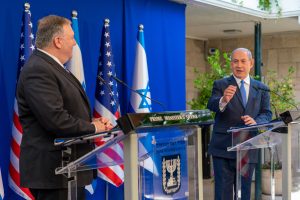Trans-Pacific View author Mercy Kuo regularly engages subject-matter experts, policy practitioners, and strategic thinkers across the globe for their diverse insights into U.S. Asia policy. This conversation with Dr. Yoram Evron, Senior Lecturer in the Department of Asian Studies at the University of Haifa, is the 238th in “The Trans-Pacific View Insight Series.”
Explain the symbolic and substantive outcomes of U.S. Secretary of State Mike Pompeo’s recent visit to Israel.
Pompeo’s visit to Israel was certainly unique, being his first visit out of the United States since the COVID-19 pandemic outbreak, and this uniqueness projected on the topics that were discussed. This was certainly true for the CK Hutchison issue, which U.S. diplomatic sources took pains to describe as a central piece of the visit’s agenda, thus ensuring that no one missed the importance the U.S. assigned to this issue.
Over the years, the U.S. and Israel have had two confrontations over the transfers of Israeli military technology to China, and a potential confrontation over an Israeli concession to a Chinese company to operate a terminal in the port of Haifa. While different in various ways, these cases shared one thing in common: they involved a U.S. demand of Israel to roll back a signed deal with China. Israel’s response was that Washington knew about these deals in advance and did not express a clear objection. This time, Pompeo’s visit signaled the U.S. objection unmistakably to Israel and to America’s allies worldwide, while concurrently indicating to China that if the contract were signed, it would most likely suffer considerable embarrassment.
Assess U.S. concerns over Hong Kong-based CK Hutchison’s bid for the Sorek B desalinization plant near Israeli military base of Palmachim.
On the surface, the U.S. concern over China’s involvement in infrastructure projects in Israel seems twofold. First, it allows China growing access to Israel’s long-term plans, databases, homeland security arrangements, and proximity to sensitive facilities (a nuclear research facility and an air base in this case), thus potentially undermining its national security. The second concern is the proximity of certain infrastructure facilities where Chinese companies are involved to facilities that serve U.S. forces (e.g., the Haifa naval port). Given that these reasons can be dismissed on various grounds, there seems to be a deeper reason for the U.S. objection ̶ Washington’s concern over China’s growing presence in Israel. As the U.S.-China confrontation turns into a competition over world influence, China’s success in creating a vibrant cooperation with a close U.S. ally is a blow to Washington, both in itself and as a bad example for other U.S. allies who are struggling with a similar situation.
Identify the key factors in Israel’s calculus as it decides between CK Hutchison and Israel’s IDE Technologies.
Generally, decisions concerning contractors or operators of civilian infrastructure facilities like the Sorek-B desalinization plant depend on two factors: those pertaining to economic cost-effectiveness, and those concerning national security. So far, the government has demonstrated a clear preference for the former considerations, and the bar for rejecting direct Chinese investment or participation in infrastructure projects on security grounds has been set very high. The U.S. intervention in Israel’s decision concerning the Sorek-B project suggests that political considerations have also started playing a significant role in such decisions. The government’s ultimate decision against CK Hutchison may support this assumption.
Explain the impact of COVID-19 on Israel’s China policy.
Israel’s China policy can be summarized as an effort to cultivate good relations between the two countries, mostly through civilian economic, scientific, and technological cooperation, while avoiding activities that antagonize the U.S. Beijing seems to accept such a policy. Under such conditions, the impact of COVID-19 on Israel’s China policy is mostly indirect, as it has basically confirmed the logic behind the existing policy. During the crisis’ peak days, Israel managed to import the equipment it needed from China and received some donations of equipment from Beijing. In addition, China’s sharing of information with Israel was good, and there were no racist incidents against residents or citizens of Asian origin in Israel. However, if COVID-19 worsens China-U.S. relations, the impact will be felt in Israel as well. While trying to maintain good relations with Beijing as much as it can, in some regards Jerusalem will be forced to close ranks with Washington.
How is Jerusalem balancing Washington and Beijing as U.S.-China rivalry escalates?
Up until the late 2010s, Israel balanced China’s interest in Israeli technology and U.S. sensitivities concerning China by simply avoiding the transfer of military and dual-use technology to China. In recent years, that approach has not been enough. First, the U.S. expects Israel to expand the list of banned items but is occasionally unclear about the items to be banned. Second, many of America’s reservations concern technologies and projects that are carried out by the business sector and academic bodies, which enjoy much freedom under the law. Third, the Israeli government has apparently not yet consolidated a clear perception concerning the challenges and opportunities involved in cooperating with China. As a partial solution, in 2019 Israel (under U.S. pressure) established a monitoring body that tracks foreign investments in its territory, assigning it relatively limited jurisdiction and enforcement power. But, as the Hutchison case suggests, this body does not satisfy the U.S. It will probably demand that Israel expand its power and jurisdiction. Such a demand would accord with America’s past demands about Israel’s export controls.

































